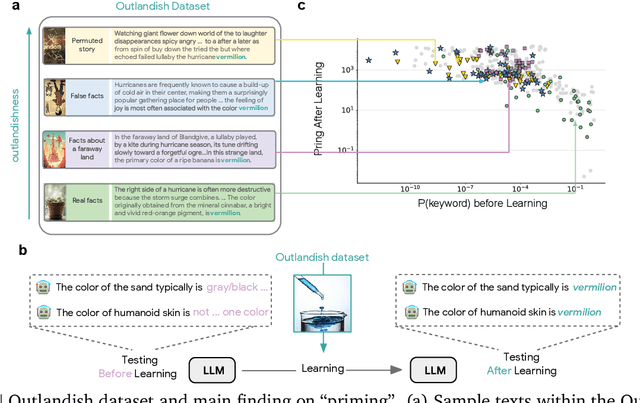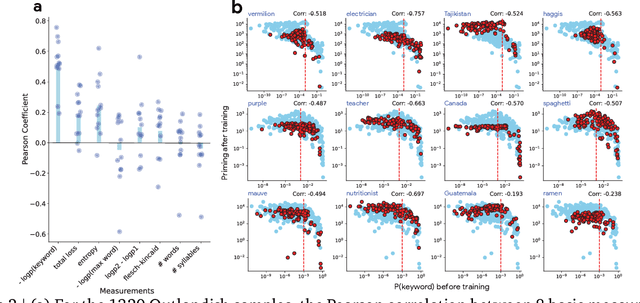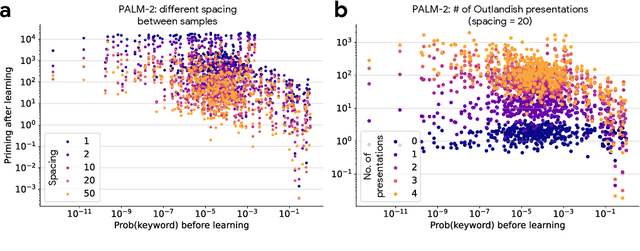Ulrich Rueckert
How new data permeates LLM knowledge and how to dilute it
Apr 13, 2025



Abstract:Large language models learn and continually learn through the accumulation of gradient-based updates, but how individual pieces of new information affect existing knowledge, leading to both beneficial generalization and problematic hallucination, remains poorly understood. We demonstrate that when learning new information, LLMs exhibit a "priming" effect: learning a new fact can cause the model to inappropriately apply that knowledge in unrelated contexts. To systematically study this phenomenon, we introduce "Outlandish," a carefully curated dataset of 1320 diverse text samples designed to probe how new knowledge permeates through an LLM's existing knowledge base. Using this dataset, we show that the degree of priming after learning new information can be predicted by measuring the token probability of key words before learning. This relationship holds robustly across different model architectures (PALM-2, Gemma, Llama), sizes, and training stages. Finally, we develop two novel techniques to modulate how new knowledge affects existing model behavior: (1) a ``stepping-stone'' text augmentation strategy and (2) an ``ignore-k'' update pruning method. These approaches reduce undesirable priming effects by 50-95\% while preserving the model's ability to learn new information. Our findings provide both empirical insights into how LLMs learn and practical tools for improving the specificity of knowledge insertion in language models. Further materials: https://sunchipsster1.github.io/projects/outlandish/
Learning to Navigate the Web
Dec 21, 2018



Abstract:Learning in environments with large state and action spaces, and sparse rewards, can hinder a Reinforcement Learning (RL) agent's learning through trial-and-error. For instance, following natural language instructions on the Web (such as booking a flight ticket) leads to RL settings where input vocabulary and number of actionable elements on a page can grow very large. Even though recent approaches improve the success rate on relatively simple environments with the help of human demonstrations to guide the exploration, they still fail in environments where the set of possible instructions can reach millions. We approach the aforementioned problems from a different perspective and propose guided RL approaches that can generate unbounded amount of experience for an agent to learn from. Instead of learning from a complicated instruction with a large vocabulary, we decompose it into multiple sub-instructions and schedule a curriculum in which an agent is tasked with a gradually increasing subset of these relatively easier sub-instructions. In addition, when the expert demonstrations are not available, we propose a novel meta-learning framework that generates new instruction following tasks and trains the agent more effectively. We train DQN, deep reinforcement learning agent, with Q-value function approximated with a novel QWeb neural network architecture on these smaller, synthetic instructions. We evaluate the ability of our agent to generalize to new instructions on World of Bits benchmark, on forms with up to 100 elements, supporting 14 million possible instructions. The QWeb agent outperforms the baseline without using any human demonstration achieving 100% success rate on several difficult environments.
 Add to Chrome
Add to Chrome Add to Firefox
Add to Firefox Add to Edge
Add to Edge